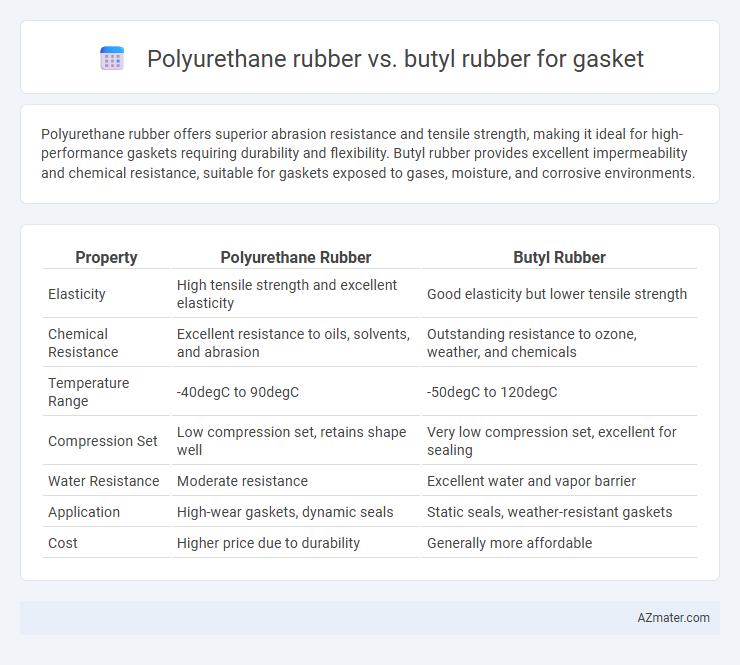Polyurethane rubber offers superior abrasion resistance and tensile strength, making it ideal for high-performance gaskets requiring durability and flexibility. Butyl rubber provides excellent impermeability and chemical resistance, suitable for gaskets exposed to gases, moisture, and corrosive environments.
Table of Comparison
| Property | Polyurethane Rubber | Butyl Rubber |
|---|---|---|
| Elasticity | High tensile strength and excellent elasticity | Good elasticity but lower tensile strength |
| Chemical Resistance | Excellent resistance to oils, solvents, and abrasion | Outstanding resistance to ozone, weather, and chemicals |
| Temperature Range | -40degC to 90degC | -50degC to 120degC |
| Compression Set | Low compression set, retains shape well | Very low compression set, excellent for sealing |
| Water Resistance | Moderate resistance | Excellent water and vapor barrier |
| Application | High-wear gaskets, dynamic seals | Static seals, weather-resistant gaskets |
| Cost | Higher price due to durability | Generally more affordable |
Introduction to Gasket Materials
Polyurethane rubber offers excellent abrasion resistance, flexibility, and chemical stability, making it ideal for gaskets requiring durability under mechanical stress. Butyl rubber provides superior impermeability to gases and excellent resistance to heat, ozone, and weathering, suitable for sealing applications demanding airtight and watertight properties. Selecting the right gasket material depends on application-specific factors such as temperature range, chemical exposure, and mechanical load.
What is Polyurethane Rubber?
Polyurethane rubber is a highly durable elastomer known for its excellent abrasion resistance, high tensile strength, and chemical stability, making it ideal for gasket applications requiring long-lasting performance. Its ability to withstand oils, solvents, and extreme temperatures without significant degradation provides superior sealing properties compared to traditional materials. Polyurethane rubber offers enhanced flexibility and resilience, offering a reliable alternative to butyl rubber in environments exposed to mechanical stress and harsh chemicals.
What is Butyl Rubber?
Butyl rubber is a synthetic elastomer known for its excellent impermeability to gases, superior chemical resistance, and outstanding flexibility at low temperatures, making it highly suitable for gaskets in automotive and industrial applications. Polyurethane rubber offers superior abrasion resistance and tensile strength but typically lacks the gas impermeability and chemical resistance that define butyl rubber's performance in sealing applications. Selecting butyl rubber for gasket materials ensures enhanced durability and airtight seals, particularly in environments exposed to gases and chemicals.
Chemical Resistance: Polyurethane vs Butyl
Polyurethane rubber exhibits excellent resistance to oils, fuels, and aliphatic hydrocarbons, making it suitable for applications involving exposure to petroleum-based chemicals. Butyl rubber provides superior chemical resistance against acids, alkalis, and polar solvents, offering better performance in harsh chemical environments. The choice between polyurethane and butyl rubber for gaskets largely depends on the specific chemical exposure conditions and required durability.
Temperature Tolerance Comparison
Polyurethane rubber offers a temperature tolerance typically ranging from -40degC to 80degC, making it suitable for moderate heat applications in gasket manufacturing. Butyl rubber withstands a broader temperature span from -50degC up to 120degC, providing enhanced resistance to high heat and extreme cold conditions. This makes butyl rubber preferable for gaskets requiring superior thermal stability and durability in harsh environments.
Durability and Longevity
Polyurethane rubber exhibits superior abrasion resistance and tensile strength compared to butyl rubber, enhancing gasket durability in high-wear environments. Butyl rubber offers exceptional chemical and ozone resistance, contributing to extended gasket longevity in applications involving exposure to harsh chemicals or outdoor conditions. For long-lasting gaskets, polyurethane excels in mechanical durability, while butyl rubber provides reliable performance in chemical and environmental resilience.
Compression Set and Flexibility
Polyurethane rubber exhibits superior flexibility and a lower compression set compared to butyl rubber, making it ideal for gaskets requiring long-term resilience and elastic recovery. Butyl rubber offers excellent chemical resistance and airtight sealing but tends to have higher compression set values, resulting in reduced flexibility and potential gasket deformation over time. Selecting polyurethane rubber enhances gasket performance in dynamic applications due to its ability to maintain shape and provide consistent sealing pressure under repeated compression.
Cost Analysis: Polyurethane vs Butyl Gaskets
Polyurethane gaskets generally exhibit higher material costs compared to butyl rubber due to their enhanced durability and abrasion resistance, making them suitable for demanding sealing applications. Butyl rubber offers a more cost-effective solution with excellent impermeability and chemical resistance but may require more frequent replacement in abrasive environments. The overall cost-effectiveness of polyurethane versus butyl gaskets depends on the specific application requirements, balancing initial material expense against long-term performance and maintenance savings.
Typical Applications in Industry
Polyurethane rubber is widely used for gaskets in automotive and aerospace industries due to its excellent abrasion resistance and load-bearing capacity, making it ideal for dynamic sealing applications. Butyl rubber is preferred in HVAC and pharmaceutical equipment for gaskets because of its superior impermeability to gases and resistance to chemicals, ensuring reliable sealing under harsh environmental conditions. Both materials play critical roles in industrial sealing solutions, with polyurethane excelling in mechanical durability and butyl rubber providing exceptional chemical and gas barrier properties.
Choosing the Right Rubber for Your Gasket Needs
Polyurethane rubber offers superior abrasion resistance and tensile strength, making it ideal for gaskets exposed to mechanical stress and harsh environments. Butyl rubber excels in chemical resistance and impermeability, providing excellent sealing performance against gases and moisture in applications requiring airtight seals. Selecting between polyurethane and butyl rubber for gaskets depends on specific operational conditions such as exposure to chemicals, temperature ranges, and mechanical wear.

Infographic: Polyurethane rubber vs Butyl rubber for Gasket
 azmater.com
azmater.com